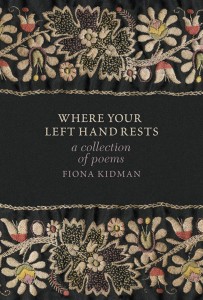Where Your Left Hand Rests
Poetry, Godwit, 2010
Synopsis: I published my first collection of poems ‘Honey & Bitters’, in 1975, a whole 36 years ago. After four collections, at some point, I simply stopped writing poems. I was a fiction writer, after all, and I needed to focus on that discipline. Or so I thought. But my love of poetry as a form has never deserted me. In Menton, in 2006, something happened. It was a time when I felt very free and happy, and one day I thought, there is something missing in my life. Reading poetry is not enough.
Armed with some glasses of rosé wine, and a pile of fresh peaches bought from the market, I set to work on the balcony of the apartment one day, and began doodling some poems. I wrote one nearly every day for the rest of the time I was in France. I wish I could say I have kept up with this daily practice, but the poems have come more slowly since then.
Godwit, Random House, under the guidance of Nicola Legat, produced a beautiful special edition of the poems for my 70th birthday. The book sold out rapidly. I hope there will be a reprint one day.
What the critics said:
‘…..always present is a sense of family, history and humanity. A bonus is the exquisite images of embroidery from Victorian Gilt, Auckland. Beautiful needlework. Superb poetry. A truly lovely little book.’ — Joy McKenzie, Metro Magazine
‘Kidman’s new poetry I stitched in the intimacy of the domestic, the feminine and the worth of handcraft. Her poetic thread is that of memory and conversation, and here Kidman gives us a second poetic gift. Her poetry reminds us that our domestic lives and the vantage point of women is of poetic consequence.’ Paula Green, in Canvas
‘An emotional odyssey to Ireland to search for her late father’s family led to the poems that dominate the collection. Although Dame Fiona found the house in Bandon, County Cork, that her paternal grandmother had grown up in, she could not find any other records, and she suspects all that remains of these people are the letters and photographs sent to her father after he emigrated to New Zealand.
From these keepsakes, [she] has created what she calls “found works”, a sequence of epistolary verses entitled Last Letters that tell of what she knows of the lives of these strangers from whom she is descended. She writes of the domestic minutiae, of little things like the weather, as well as greater ones like loss and inheritance.’ Nicky Pellegrino in The Herald on Sunday

